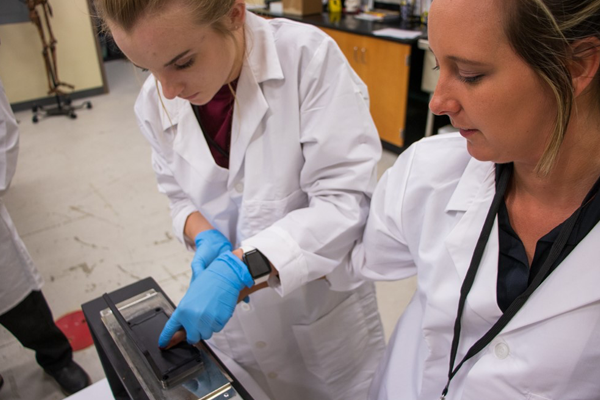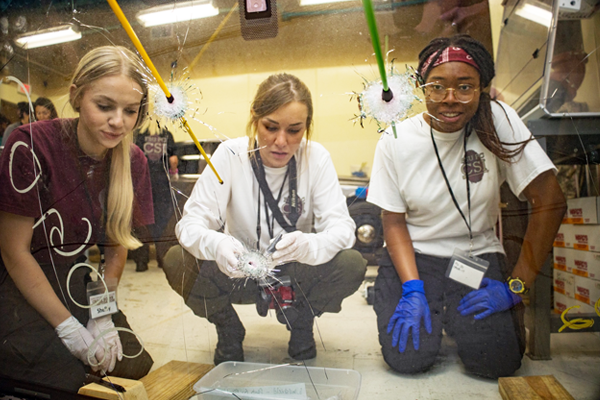SCIENCE POLICE
It’s no mystery why students are drawn to the Crime Scene Investigation program at FSU Panama City.
TV crime dramas may have given the public an unrealistic idea of what CSI can accomplish in an hour’s time, but these shows—as well as “true crime” podcasts and documentaries—have also promoted the profession in such a way that it is appealing as a career.
Housed under FSU PC’s Public Safety & Security umbrella, the CSI major integrates analytic and hands-on skills with the theoretical principles needed to properly identify, document, process, collect and analyze evidence.
“Right now, we have about 100 students in this program,” said Banyon Pelham, assistant dean for the College of Applied Studies and a member of the teaching faculty. “There’s forensic science offered at other places, but in Florida, Crime Scene is us.”
Pelham said most law enforcement agencies in Florida have a CSI graduate from FSU PC working on staff.
“Anyone who wants a job gets one,” said CSI Program Coordinator and instructor Charla Perdue. “Crime is not going away. We call it job security.”
HANDS-ON LEARNING
On a recent afternoon, a student in one lab brushed graphite powder gently onto a flat surface to reveal unseen fingerprints; she explained that the graphite adheres to oils left behind from the skin of the person who touched the surface, making the prints visible.

Meanwhile outside, four students studied a car riddled with bullet holes. They placed markers where shell casings lay on the pavement, inserted colored rods into ballistic punctures to determine entry angles, photographed blood stains on the vehicle and in the parking lot.
In another room, students studied bullet holes in a variety of wood, dry wall, glass, fabric and other surfaces to determine caliber, angles, entry- and exit-holes, and other specifics of ballistics.

And behind hanging sheets of translucent plastic in a portion of the “dirty lab,” students bashed a simulated skull with a baseball bat to produce blood trails on the floor and walls, then other students used laser pointers and colored cords to determine the trajectory and origin points of the blood. They learned the technique using a bright scarlet dye, then moved on to examining the qualities of various kinds of blood, including animal blood.

Earlier in the week, they attended an autopsy demonstration at the Medical Examiner’s Office. A couple of days later, they explored an outdoor area to locate a buried “skeleton” and disinter the bones.
“There’s something very satisfying about removing the earth and finding something,” Perdue said. “I like to watch the students at the autopsy and doing blood spatter, because they seem to be most interested in that. “
TRICKS OF THE TRADE
Students must learn a variety of techniques, including multiple ways of working with limited evidence to achieve results. They draw latent prints using various chemicals, as well as developing prints from wet items or varieties of adhesive tape. They study laser microscopy to determine animal vs. human hair, use 3D scanners as well as sketches, build a Faraday cage, and take teeth impressions.
“Everybody’s going to work at a different agency, and agencies have different budgets, so we kind of want them to know some of the tricks to be able to do something regardless,” Perdue said. “The nice thing about doing a little of everything is they usually find an area that they really want to hone in. So, they may want to specialize—crime scene, lab, death investigator, autopsy technician. It’s fun to see where they land after graduation.”
For instance, one graduate now works for NASCAR in accident investigation and cleanup. Another investigates insurance fraud.
Cienna Thomaston, 23, is a ’21 grad of the CSI program who now works as a civilian Crime Scene Investigator for the Bay County Sheriff’s Office. Originally from Bruce, where her family members run a crossroads café, she came to FSU PC planning to major in math. Her mother suggested she try CSI.
“As soon as I started it, I fell in love with it,” Thomaston said. “It’s definitely for people with a certain heart, a certain mindset, because you do or can experience a lot of troubling things.”
EYE-OPENING DETAILS
Cassie Mack, 20, will graduate in 2025. Part of the Underwater CSI program, she grew up near Baltimore. Several of her family members are law enforcement officers in the Washington, D.C., area. Having attained an associate’s degree in Criminal Justice, she chose FSU PC for its CSI program.
“Coming down here and seeing the forensic side of it definitely was an eye-opener,” Mack said. “There’s just so much else, a whole different world in it. It opened my mind and made me fall in love with it so much more.”
One of the high-tech tools that fascinates Mack is a new DNA technology that can pull usable samples from decades-old evidence to revive a cold case. In addition, new HD digital cameras used by students have macro lenses that can examine “every ridge in your fingerprint,” she said.
“We do a lot of hands-on things,” Mack said, noting the blood spatter lessons as her favorite activity so far. “I love seeing all the different types, seeing if you hit someone in the head how that’s going to look.”
Mack credited her instructors for their support and the sense of community they foster. “I love this campus. I would never want to do anything else,” she added.
Originally from New York, 22-year-old Alex Joseph was living in Tampa during the COVID-19 lockdown. She visited FSU PC to check out the programs and found herself creating blood spatters and studying bullet holes.
“There’s a lot more behind the scenes that you don’t think about,” Joseph said, pointing out that ballistics went from being her least favorite activity to her dearest. “I was like, oh my gosh, which one’s a groove, which one’s a landing, how do I tell if there’s striations? When I got more into it in class, I was on it. It was so weird because I went from hating it to really loving it.”
Joseph said her instructors focus on students more than she saw at larger institutions: “Getting in to talk with teachers or having a relationship with them is a lot more difficult at other places. You don’t have that relationship at a bigger campus. They’re not focused on individual students, they’re focused on the class as a whole.”
Learn more about the CSI track, including certification in Underwater CSI, at PC.FSU.edu/csi.
